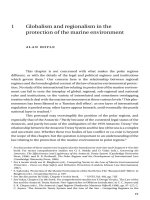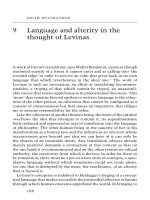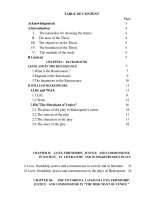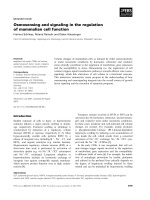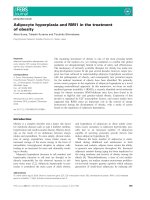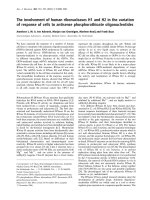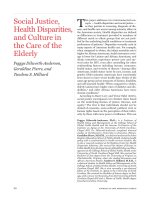- Trang chủ >>
- Khoa Học Tự Nhiên >>
- Vật lý
nanotalk. conversations with scientists and engineers about ethics, meaning, and belief in the development of nanotechnology, 2006, p.378
Bạn đang xem bản rút gọn của tài liệu. Xem và tải ngay bản đầy đủ của tài liệu tại đây (1.55 MB, 378 trang )
NANOTALK
Conversations With Scientists
and Engineers About Ethics,
Meaning, and Belief in the
Development of Nanotechnology
This page intentionally left blank
NANOTALK
Conversations With Scientists
and Engineers About Ethics,
Meaning, and Belief in the
Development of Nanotechnology
by
Rosalyn W. Berne, PhD
LAWRENCE ERLBAUM ASSOCIATES, PUBLISHERS
2006 Mahwah, New Jersey London
ThematerialinthisbookisbaseduponworksupportedbytheNationalScienceFounda
-
tion under Grant No.0134839.Any opinions, findings, and conclusions or recommenda
-
tions expressed in this material are those of the author and do not necessarily reflect the
views of the National Science Foundation.
Copyright © 2006 by Lawrence Erlbaum Associates, Inc.
All rights reserved. No part of this book may be reproduced in any
form, by photostat, microform, retrieval system, or any other means,
without prior written permission of the publisher.
Lawrence Erlbaum Associates, Inc., Publishers
10 Industrial Avenue
Mahwah, New Jersey 07430
www.erlbaum.com
Coverphotograph byGordonD. Berne: TheScientists,artist, Elaine Pear
Cohen. This sculpture sits in front of Marine Biological Laboratories in
Woods Hole, Massachusetts.
Library of Congress Cataloging-in-Publication Data
Berne,RosalynW.
Nanotalk:conversationswithscientistsandengineersaboutethics,
meaning, and belief in the development of nanotechnology / by
Roslyn W. Berne.
p. cm.
Includes bibliographical references and index.
ISBN 0-8058-4810-X (alk. paper)
1. Nanotechnology—Philosophy. 2. Nanotechnology—Moral and ethical
aspects. 3.Scientists—Interviews. 4.Engineers—Interviews. I. Title.
T174.4.B37 2005
174.96205—dc22 2005040158
CIP
ISBN 1-4106-1563-4 Master e-book ISBN
This edition published in the Taylor & Francis e-Library, 2008.
“To purchase your own copy of this or any of Taylor & Francis or Routledge’s
collection of thousands of eBooks please go to www.eBookstore.tandf.co.uk.”
Dedicated to my husband Gordon Berne
our children Kaya, Ari and Zoe;
my parents Roland and Muriel Wiggins;
Beth and Robert Berne
And in memory of John C. Fletcher;
bioethicist, mentor, teacher, and friend
This page intentionally left blank
Contents
Foreword xi
Preface xiii
Acknowledgments xv
Russell 1
Introduction: Narrative and the Voices of Research
Scientists and Engineers
17
Researchers as Experts 21
Limitations on the Voices of Researchers 24
Scientist as Person 26
Narratives in the Public Discourse 28
Research Project: Meaning and Belief Inside the Development
of Nanotechnology 30
I. ETHICS
1 The Nanotechnology “Revolution” 41
From Vision to Initiative 43
Riding the Wave of Research Funding 46
Venturing Into Uncertainty 47
Where Is the Moral Leadership of this Revolution? 56
Responsibility for an Unpredictable Technological
Revolution 56
Caroline 59
vii
2 Three Dimensions of Nanoethics 74
Ethically Challenging Characteristics of Nanotechnology
Development 76
Approaching an Ethics of Nanotechnology 76
A Three Dimensional Framework 79
First Dimension Nanoethics 79
Second Dimension Nanoethics 82
Third Dimension Nanoethics 88
Directed Rather than Determined 92
Beautiful Science in a Social Context 92
Luis 95
II. MEANING
3 Conceptual Frameworks, Themes, and Values 111
The Responsibility of Society for Ethical Nanotechnology 114
Lan 119
The Moral Neutrality of Nanoscale Science and Engineering 122
The Inevitability of Nanotechnology Development
(Determinism Lives On) 128
All Knowledge is Good and Technology is Neutral 135
Values in Nanotechnology Research and Design:
The Case of the Aerogel 140
Timothy 142
4 Meaning Making 160
The Making of Meaning 160
The Negotiation of Self in Technology 162
Intentionality and Responsibility 164
Recreating the World, Ourselves, and Our Senses 168
Meaning Making and Change 173
Pseudovalues Disguising Technology’s Black Boxes 174
Nathan 178
III. BELIEF
5 New Knowledge and Nature 201
New Knowledge, Myths and Manipulations 204
viii CONTENTS
Scientific Understandings of Nature 207
Nanotechnology as Another Response to Nature 209
Control and Fear in the Manipulation of Nature 212
Nature as Inspiration and Master 216
Striving for Knowledge From and About Nature 218
Back to Eden 232
Cecelia 236
6 Imagination, Metaphor, and Science Fiction 244
Science Fiction as Predictor 245
Cultural Criticism or Analytical Philosophy? 245
Science Fiction as Cultural Narrative 248
Technological Projections of Self 261
Myths of Metamorphosis 263
7 Noble Revisited 267
The Mythic Religion of Technology 269
Myth 272
Kent 273
Noble Revisited 287
Geoffrey 292
8 Conscientious Moral Commitments 309
Proposal for the Humanitarian, Conscientious Pursuit
of Nanotechnology 312
Humanitarian Hopes and Practical Limitations 316
Final Thoughts 325
Appendix A: Methodology and Preliminary Research
Findings
326
Emergent Categories and Properties of Analysis 327
Appendix B: History of the Nanotechnology Initiative
in the United States
337
Appendix C: Interview Protocol 339
Appendix D: 21st Century Nanotechnology Research
and Development Act
342
CONTENTS ix
Impact of Public Law 342
Legislative History 343
References 345
Further Reading 347
Author Index 351
Subject Index 353
x
CONTENTS
Foreword
Standard procedure in academic publishing is for a manuscript to be re-
viewed, which gives the author an important opportunity to say “Oh! I
hadn’tthought of that” or “Oops,” and then make corrections and changes
to improve on the original document. The reviewers of this manuscript
were wonderfully encouraging and, fortunately for me, detailed in their
critiques. One point of criticism, however, warrants mention in a fore-
word; that is, consideration given in Nanotalk to questions of faith, belief,
and God as they may be relevant to conversations about nanotechnology.
The reviewer wondered why I “danced around the subject of whether or
not God exists,” and why “I failed to be clear about that.” Forthat reviewer,
the matter is straightforward. He wrote “God is what people place in the
gap between whatweunderstand and whatweexperience …. We thought,
many years ago, that lightning must be a god throwing down thunder-
bolts. What else could it be? But now we understand what lightning is, and
have no further need for a god of lightning. We still marvel at seeing light-
ning and shudder at its immense power. But it is not a religious experience
anymore.Zeuscan rest in peace.” Thatsame reviewer said he felt irritation
over not being able to be with me and my researchers during our discus
-
sion in order to correct us with the understanding that it is a very human
desire to invent supernatural beings for things we do not understand. He
concluded, “Someone reading Berne’s book 100 yearsfrom now will find it
very amusing, indeed.”
My purpose has been to garner from individual nanoscale science and
technology researchers a sense of what matters to them, what inspires
them, concerns them, motivates them, and instills curiosity in their work
toward the research and development of nanotechnology. Whether or not
they believe in Zeus (or Yahweh, Allah, Jehovah, or Brahma) and what
those beliefs maymean to them in the societal contextof developing nano
-
xi
technology is only significant here to the extent that it offers a fuller view
of who they are as individual researchers in the context of nanotech
-
nology quests. It does not matter how curious, peculiar, or even amusing
those beliefs may appear 100 years from now. What matters are the stories
we tell one another now, and how the narratives we weave form and
ground the basis of nanoscience and nanotechnology endeavors.
A question I have asked of my self while listening to researchers talk
about their work is whether and how faith, agnosticism, or atheism might
play a role in the pursuit of nanoscaled science and technology. In what
way might the human quest to control and manipulate the physical uni
-
verse be a response to beliefs about the will and existence of God? I some
-
times raised these questions in the conversations. As such, the reader will
find here and there throughout the text—varied and sometimes abstract—
other times explicit, references to that which might be understood as Mas-
termind and First Mover of our worlds, or God.
As for my own beliefs, I have no other explanation for the incredible
complexity and absolute profundity of the universe, especially of life, ex-
cept for the existence of an Infinite Intelligence and Creative Force,
which/who enjoys dancing even more than I! I do not accept as true, as
does my reviewer, that God’s existence is a human creation for the sake of
explaining that which is otherwise frightening or perplexing.
The cover of a 2005 issue of MIT’s Technology Review magazine reads
in bold, “God; But for How Long?” Although the actual subject of the in-
side story is a computer search engine, the title is clever in that it grabs at-
tention with the haunting notion that God’s existence is subject to
change. It seems to me that whereas increasing scientific knowledge and
technological abilities may change ideas and beliefs about God, these
don’t necessarily negate the existence of God, at all. Rather, the evolving
ability of the human mind tograsp and perceiveGod’sexistenceas know
-
ablereality will for some human beings depend entirely onhowscientific
understandings and technological creations mature and evolve. One
hundred years from now, those who do laugh at Nanotalk’s references to
God, may very well be laughing at the limited, primitive, and ignorant
nature of our current abilities to perceive and understand God’s pres
-
ence in ourselves and in the Universe.
—Rosalyn W. Berne
Charlottesville, VA
xii FOREWORD
Preface
Many different people are talking about nanotechnology these days. In
federal agencies, staff members are talking about funding initiativesfor its
research. Politicians are talking about new jobs that will be created as a re-
sult of its development. Economists speak of its potential for new interna-
tional markets. Science fiction portrays its potential horrors. Scholars are
publishing papers on its social, legal, educational, and policy implications.
Industry analysts speculate on nanotechnology as the future for drug de-
livery, semiconductors, and energy. Transhumanist chat rooms claim it as
the answer to human radical life extension. Whether through the media of
magazines, academic journals, radio talk shows, novels, the World Wide
Web, or legislative session proceedings, nanotechnology is a very popular
subject of discussion. But, neither the popular press nor the literature of
scholars has yet to adequately deliberate the ethical implications of nano-
technology from the perspectives of scientists and engineers who are
themselves the researchers of it. That is the purpose of this book.
Nanotalk is written by an academic scholar, with thehopes of reaching a
broad audience. Whether it is read by curious individuals with an interest
in technology and the future, or used in undergraduate or graduate school
classrooms of philosophy, science & technology studies (STS), engi
-
neering ethics, nanotechnology, or science education, the author’s inten
-
tion is to contribute to the public discussion of what nanotechnology may
mean to human life. For some readers, the primary interest may be the
thoughts and ideas of actual nanotechnology researchers, as revealed
through the conversations that are the core of this book. For others, the
rhetorical and philosophical interpretation of those conversations are of
interest, and become the subject of their reflection and study. Hopefully,
all readers will come to appreciate the importance of taking a conscien
-
xiii
tious approach to developing nanotechnology, with careful deliberation
toward humanitarian purposes and uses.
The book begins with the full text of a conversation with a research sci
-
entist named Russell. That conversation is placed at the beginning, before
the book’s introduction, in order to set the tone for the subject of nano
-
scaled science and technology, in the context of theindividual researcher’s
own thoughts, beliefs, and ideas. It gives the reader an immediate sense of
what the conversations are like, what kinds of issues and subjects are
talked about, how they flow, and what it is like to “listen” to the scientist
speak through the medium of conversation with the author. However, no
interpretation is offered. The meaning of the conversation with Russell is
left entirely up to the reader.
The introduction to the book is placed after the conversation with
Russell. It explains the importance of listening to research scientists and
engineers and of including theirindividual voicesin thelarger public dis-
courses about nanotechnology. It then details a research project funded
by the National Science Foundation, which serves as the basis of this
book, to begin to address ethical questions pertaining to nanotech-
nology researchand development. Threemain parts follow the introduc-
tion. Excerpts of individual conversations are placed and discussed
within the individual chapters. Full text conversations stand alone in be-
tween the chapters of each part. Those conversations serve to provide a
subtext, of sorts. As freestanding texts, the possible meanings and impli-
cations of the content of the conversations is determined by the reader.
However, the placement of those conversations is strategic, because the
content alludes to some of the subjects that are significant to that partic-
ular part. For example, the conversation with Carolineis placed inside of
Part I, Ethics; because the content of her conversation was pertinent to
the subject of moral responsibility for nanotechnology. In fact, it is the
conversations themselves which determined much of the content of the
book. In other words, it is the author’s interpretation and analysis of the
conversations that determined the book’s organization, and the subjects
of each chapter.
Part I, Ethics, considers questions of responsibility for moral leader
-
ship of the so-called nanotechnology revolution and suggests that such
responsibility is critical. It also offers a particular analytical approach to
the formulation of anethics of nanotechnology, suggestingthat no exist
-
ing normative approach is sufficient toaddress the unusual elements of a
technology whose future is so vast while also being virtually unpredict
-
xiv PREFACE
able. Part II, Meaning, moves toward an analysis of the conversations. It
identifies themes and frameworks that appear with some consistency in
the conversations and the implicit activity of meaning making that they
entail.
The third and final part of the book, belief, shifts away from normative
concerns of what nanotechnology might mean, to metaethical consider
-
ations of belief. Working with conceptualizations of nature, and the use
of imagination, myth, and metaphor in the construction of belief, Part III
is concerned with the moral choices that come from recognizing that be
-
lief, rather then absolutes about human evolution through science and
technology, is an essential feature of nanotechnology development.
ACKNOWLEDGMENTS
At this point I wish to express my appreciation for all those who have
helped me with this project. From the very conceptualization of the
book to its final editing, the tremendous help I have received has been a
testimony to the fact that writing a book is not something that one can
do alone. After first thanking the staff of the National Science Founda-
tion who encouraged the initial proposal for this work (especially Joan
Siber) there are many others to thank. Absolutely central to this entire
project have been the scientists and engineers who kindly gave of their
time to meet with me for these conversations. (I promised to keep their
identities anonymous so that they could feel comfortable speaking
openly with me, otherwise I would thank them by name.) Attorney
Philip Lamar explained to me the contractual elements of working
with publishingcompanies. Publishing agent Stan Wakefield presented
my proposal toboth academicand trade publishers. Whenit cametime
to make a decision aboutwhichpublisher’s offer to accept, his guidance
was enormously helpful. I have received incredible support, encour
-
agement, and the timely responses from Lawrence Erlbaum Associates
editors, Bill Webber and Lori Stone. Everyone I have been in contact
with at Erlbaum has been helpful, kind, and attentive.
Midway through this project, I needed to go to a place where I could
think and write without distractions, so that I could truly immerse myself
in a world of nanoscience research. Leonard Feldman, director of Vander
-
bilt’s Institute for Nanoscale Science and Engineering, made that possible
through a visiting professorship at Vanderbilt. While I was there, chemist
Sandra Rosenthal’s graduate students showed me around, demonstrated
PREFACE xv
the microscopes, and explained to me all about their work. After spending
my days on the Vanderbilt campus, I was very fortunate to be able to go
“home” to evening writing at the Hermitage Hotel. The very professional
hotel staff provided for me a safe, nurturing, and comfortable place to be
wherepeopleactuallyknewmebyname.
Kay Neeley got me thinking about conceptual roadblocks, which led to
a flow of many new ideas for my approach to the book. Joe Pitt made a
close read of Part I in its very early stages; by offering both suggested
changes and corrections. Bernie Carlson helped me think clearly again
when the fog descended. Mike Gorman encouraged me to apply for the
original research grant. Deborah Johnson,my department chair, reassures
me that being unconventional may actually allow me to seethings abit dif-
ferently, and from this unusual perspective, is what gives me something of
significance to say. She provided the leave of absence I needed for uninter-
rupted focus on getting this book written. I am ever grateful for Ingrid
Townsend’s wisdom, mentoring, friendship, and support. Emmanuel
Smadja worked as my research assistant. His critical mind and attention to
detail have been invaluable. A special acknowledgment goes to Isis
Ringrose, whose consultations offered immeasurable insight, and whose
encouragement lifted me up from out of more than a few moments of dis-
illusionment, self-doubt, and anxiety. And, finally, I give thanks to my hus-
band Gordon, who not only cares for me, but also assures that family and
home are well cared for during all of my travels, writing sprees, and ex-
tended periods of total distraction. Thank you all.
xvi PREFACE
Russell
ROSALYN: Alright, assuming a divine order or intelligence in the universe, is there
a connection between that intelligence, and our increasing capacity to
manipulate and control the material world, and where we seem to be
going with it? If there is one, that’s what I want to talk about today.
RUSSELL: OK.
ROSALYN: I am searching for a reason for this madness, whether it has to do with
the convergence of these technologies that are emerging and what that
might mean in terms of a radical reconstruction of humanity. That
gives me pause to ask, OK is there something cosmologically connected
to what we’re doing?
RUSSELL: That’s a very large question. I told you I read Prey this summer.
ROSALYN: Yes, you did.
RUSSELL: And I guess for the first time I would say I understood why it is that
some thoughtful people might look at the possibilities of nanoscience
and say “thanks but no thanks” and it has to do with this convergence
of bio and nano and info in the creation of self-adapting mechanisms.
ROSALYN: Right.
RUSSELL: But also with the possibility of self-adapting mechanisms that are freed
from one of the very important constraints of evolution in the historic
past as in the long past. That is, as you discover in reading the book,
the problem is there are no natural enemies to this system that has been
created and therefore there is no check or balance on what evolves from
this and if the creators of the system do not have, or by some means
lose their sense of direction about what it is they want to have happen,
then you have this situation that … I think in my very first conversa
-
tion with you I mentioned this sentence from Hannah Arendt’s, On
Human Condition that has stuck with me. “Then we become
thoughtless creatures at the mercy of every gadget that is technologi
-
cally possible no matter how murderous it is.” In that sense,
nanoscience is no different from atomic weapons technology, for exam
-
1
ple, but it is more dangerous. I think it’s potentially more dangerous. I
worry about it in the sense that I happen myself to believe that there is
an order in the universe and that there are certain things that are natu
-
ral and appropriate and so on and there are other things that are not. I
worry about the fact that the scientific community and especially in the
live sciences part (and this is true at the intersection of nano and bio as
well) is also inhabited by some people who may be among the most
thorough going materialists and reductionists in the entire scientific
community, and that’s a worrisome prospect.
ROSALYN: I think that’s in part where my question is coming from. OK, are you
suggesting that there may be limits other than material limits to what
we do with nanotechnology?
RUSSELL: There are two kinds of answers to that question I can think of. One is
the question of whether or not the technologies themselves have the po-
tential to do harm.
ROSALYN: Sure, sure.
RUSSELL: OK, and that clearly is wrong. But then there’s also the question that
Freeman Dyson has raised very articulately in recent years and that is,
in the face of enormous needs that are far more basic than the issue of
whether we can compress a computer to the size of a pinhead, are we
justified in pushing ahead and spending lots and lots of money to do
this in the hopes of creating economic benefits, perhaps technological
benefits, when in fact, some of us who are working on this ought in-
stead to be building houses in Paraguay, or …
ROSALYN: If we would we just get potable water to everyone on the planet.
RUSSELL: For example.
ROSALYN: Yes we could, so why don’t we?
RUSSELL: We probably could. And, in fact, it is possible that nanoscience might
well contribute to that. As you probably know, environmental issues
like that are a major part of the Rice initiative in nanoscience.
ROSALYN: That’s what I understand.
RUSSELL: Perhaps if our focus is on things like that, then ultimately people will
say yes, there is something more than just curiosity value or gadget
value in what comes out of nanoscience.
ROSALYN: What I’m hearing is that fundamentally this is about curiosity and
that there is great satisfaction in the hope that it could actually im
-
prove the quality of life.
RUSSELL: Yes.
ROSALYN: OK.
RUSSELL: That’s fair.
ROSALYN: When I ask what are we really up to, and I would love to know, the an
-
swers are more varied than that. Do you think about this? In the larger
scheme of things, what is it we’re up to? Are scientists and engineers
2 RUSSELL
doing something for the whole of humanity? You serve a very specific
role in terms of the human community. For those of you who are pur
-
suing scientific knowledge and particularly the application of it to
nanotechnology, what is that all about? Particularly in terms of that
divine order that we have agreed exists?
RUSSELL: OK, I think if you ask that question in a university, you’re likely to get
a different answer than if you ask it in the Naval Research Laboratory
or at a pharmaceutical research facility such as Merck, Sharpe, and
Dohme.
ROSALYN: Sure.
RUSSELL: All those places have nanoscience efforts going on.
ROSALYN: Merck is a for-profit pharmaceutical, we know what they’re doing.
They are doing basic research to bring new drugs onto the market
which will increase shareholder value.
RUSSELL: The executive from Merck next to whom I rode on an airplane recently
said that they weren’t always attentive to increasing shareholder value in
the long run. He felt that in some cases they had neglected basic research
over the last 4 or 5 years, increasing shareholder value in the short run
but leaving the company in a weaker situation in the long term.
ROSALYN: Hum.
RUSSELL: Be that as it may, in a university I think the situation is a little different
in the following sense. At least in the physics department we are relatively
remote from interest in applications, the focus is on trying. In nanoscience
I see as one very interesting aspect of the whole question of can we learn
to understand very complicated material systems better than we presently
do and nanoscale objects, especially as we learn how to fabricate them,
give us an opportunity to ask those questions in a way that we never
could before and to isolate features of complex behavior that we could not
understand before. The long-term view of that and my belief as a re-
searcher, whether with undergraduate or graduate students, is that my
contribution to the world revolves less around whatever specific things I
am doing at any given time and much more around my capacity, my op
-
portunity to interact with very bright young people and train them in the
art of solving complicated problems while learning a certain set of skills,
which they apply. That capacity in some sense adds to the store of hu
-
man potential that is available for solving problems. Some of my students
are in the academic world, some of them are in the industrial world,
some of them are at national laboratories, so my hope is that they are
carrying with them that sense of how to responsibly, creatively, effectively
go about applying those skills that you learn in universities to the solu
-
tion of other classes of problems. But there is nothing in that activity as I
see it that relates explicitly to the ethical or moral dimensions of the ques
-
tion that you ask. I mean, the only way those things get developed in our
RUSSELL 3
group is through the informal interactions that we have with one another
as individuals and not particularly as scientists.
ROSALYN: That’s understandable. As I have remarked to others, we bring our
-
selves with us to work. In one conversation I asked, “Was it necessary
to check your belief system at the door?” And the response was in effect
“yes,” because there is not room for those questions in science. They
just don’t have any relevancy in science, which is about discovery and
learning, so.
RUSSELL: Yes, but if you, if you water at a public trough as we do, in terms of
where our funding comes from.
ROSALYN: Yes?
RUSSELL: Then it seems to me that implicitly, if not explicitly, you cannot check
your belief system at the door because you must have some sense of the
value of what you are doing to the people who pay for it.
ROSALYN: If you take your water from the trough of the public, but inside you
have a belief system where you take your water from the trough of
God, then how does this work with nanoscience research?
RUSSELL: Well, in our faith tradition, there is a very strong concept of stewardship,
of individual stewardship, not only over material sources, but over time,
energy, and the sense that all of these things are, well in fact, this idea;
this notion is generally referred to in our church as the law of consecra-
tion and stewardship. The idea is that fundamentally everything that we
have and are or can be is a gift from God and that we as stewards are
obliged to both husband it carefully but also to recognize that life itself
and all that we do in it, whether it is my work here or time spent with
our children or whatever, is in some sense to be lived as a consecration
and—the way I put it is that my own personal view of myself is that
there is no part of my life, at least to the extent that in my life’s activities
I am doing things that I know I should rather than things I know I
shouldn’t—that all of that is part of this idea of a consecrated steward
-
ship; whether it is involved with doing physics or listening to music or be
-
ing with my wife or whatever. So for me, I don’t feel the necessity for
checking anything anywhere, it’s all kind of a package.
ROSALYN: Now whether or not other scientists, nanoscientists, have that belief,
would you say nanoscience is a gift from God?
RUSSELL: Yes, especially to the extent that it has the potential to relieve suffering,
to make the world environmentally or ecologically a better place than
what it has been or is now. If nanoscience could, for example, rescue us
from some of the pollution created by an industrial revolution which
was too little animated by use of stewardship, for example, long-term
responsibility, sure, and I think also pure curiosity has a place in that
world. I don’t think that the idea of stewardship is necessarily bound
up entirely with utilitarianism.
4 RUSSELL
ROSALYN: Yes.
RUSSELL: You know, if Johannes Kepler could look at his planetary ellipses and
believe that through this new geometry that he developed that he was
getting a glimpse into the mind of God, then why not through
nanoscience? The nearest example I can think of is actually from biol
-
ogy (and I am sure that my colleagues in the bio side would say this is
an extraordinarily simpleminded view), but one of the things that
amazes me about what we’ve learned about biology at the nanoscale is
that what appeared to be extraordinarily complex systems are in fact
made from a remarkably small number of very beautiful simple build
-
ing blocks and they go together in the most amazing ways. Last week I
gave a colloquium and in honor of the occasion I fished out one of my
very favorite quotations from where Brigham Young says that “man’s
machinery takes things which are different and tries to make them all
alike. God’s machinery takes things which appear to be alike and im-
parts to each a pleasing difference.” And so if I think about how people
look at nanoscale building blocks of sea animal shells, for example,
crustacean shells, and they find that there are these wonderful varie-
gated patterns that arise out of, again, very simple building blocks, and
apparently quite simple processes but with little twists and turns, I
guess I would say I find room for that in my view of nanoscience just
as much as Kepler found room for his ellipses in his astronomy.
ROSALYN: So then it all comes together inside of that divine order?
RUSSELL: It does for me.
ROSALYN: And, what do we do about the stewardship, for the whole of scientific
inquiry. Is there anything we can do? Say I want to say that’s a good
thing and that’s a commitment I think should be broadly held, and if
we’re all swimming around in the soup of meaning making and belief,
as it were, I would want that to be a universal principle. (Yes, that’s a
value judgment.) How do we get nanoscience as an enterprise to be an
enterprise of stewardship over a gift and a capacity?
RUSSELL: I find it difficult to imagine that you can create a new directorate in
the National Science Foundation which does this. However, I do believe
that in some sense it is an absolute good that people at the National
Science Foundation are asking this question. The formation of a direc
-
torate to do this would suggest that either there was a straightforward
answer that could be achieved by a bureaucratic administrative tech
-
nique of some kind, or that there was some terrible problem that cried
out for an answer and could not be let alone on political grounds. But I
think that to the extent that people are raising these questions, then
good things are likely to happen. I mean there are a number of centers
that deal with issues like this. There is this center at Berkeley for The
-
ology and Natural Science. Another example is the new initiative at
RUSSELL 5
Vanderbilt, a Center for the Study of Religion and Culture. I spoke
with one of the codirectors about the possibility of trying to build a
project around that. That center would be a very good place for a vari
-
ety of reasons to do something that pulls in bio, nano, and info technol
-
ogy into a group that includes also some very thoughtful, interesting
people from philosophy and religion to talk about these issues. They
don’t teach you this in graduate school. I mean, the feelings that I have
expressed to you about stewardship are things that come from my fam
-
ily and my church and from long sessions late at night talking with peo
-
ple about things and from interacting with people who have different
sets of values. And I think that the only way to try to make this a com
-
ponent of nanoscience is to make places where people are able to engage
one another in dialogue about these issues.
ROSALYN: That would be a wonderful opportunity.
RUSSELL: But see, you’re a part of that in the sense that you’re going around …
ROSALYN: Having these conversations.
RUSSELL: Like Socrates asking people these annoying questions.
ROSALYN: I know, that’s true. Bear with me on this one.
RUSSELL: But nobody’s passed you a cup of hemlock yet, so this is …
ROSALYN: Not yet, heaven forbid. OK, now supposing we’re not very good stew-
ards of this gift, is there a chance that, aside from the obvious sort of
catastrophic harms that can come to humanity, that the appearance of
progress, the appearance of mastery of the material world will take us
into a spiritually dangerous place. Such as, oh, nanoscaled circuits lin-
ing our neural system and connected to computers or some of these
other far out notions of what could be possible for life extension or for
transportation of the body. People say you can only do what’s within
allowable physical law, but we continue to sort of reconstruct our no-
tion of what the universe is and how it functions, so if that’s bendable
and flexible and our capacity to master it increases, is there any chance
that we are embarking on a place that will compromise our fundamen
-
tal humanity or ourselves, as we were created. Or are we on an evolu
-
tionary journey?
RUSSELL: Yes and no. I mean, I think that clearly there are dangers. Michael
Crichton sees one kind.
ROSALYN: The physical danger.
RUSSELL: There is the possibility of physical danger. I don’t know of anyone who
is writing about the spiritual danger. Part of the spiritual danger, of
course, can come from the becoming enraptured with this to the point
where it excludes other things and say, well this is just too important.
ROSALYN: And my concern, my question is whether in fact our rapture will lead
us to no longer needing even a sense of there being a God because all
the reasons we might have had are no longer meaningful. If we don’t
6 RUSSELL
die, we don’t get sick, you know, we don’t feel vulnerable. I personally
think there are all kinds of other reasons to have that relationship and
belief, but culturally a lot of it did come out of those bodily limitations
or perceptions of bodily threat to survival.
RUSSELL: I take to some extent a different view of that, and that is that in spite
of the urban legend that we tell ourselves that progress is speeding up,
if you look over the last century, yes, a lot of things have happened on
a lot of different fronts, but it still takes about a generation to move
anything from the laboratory to any practical application, and my ex
-
cuse for not worrying too much about that is to say probably a lot of
these dangers are unlikely to happen in my lifetime and for that reason
I don’t worry about them. But also it’s because I believe that even
though we may be able to make on a demonstration basis things that
appear to show, for example, that we can make an artificial skin for in-
fantry soldiers that would be self-healing, anything that we envision
presently in that regard is so hugely expensive that people will still be
going to Fort Benning 30 years from now and doing things in very simi-
lar ways.…
I think the greater danger is that by coming to focus on these, let me
call them man–machine interfaces, things where we are trying to invent
artificial substitutes for things, or artificial enhancements for our life
and so on, that we can become so preoccupied with those simply be-
cause they are interesting and crowd out other things, that we then
suddenly discover that we are no longer easily able to resolve issues that
can’t be solved by technological means. There was a very interesting in-
terview on NPR last night with a Palestinian attorney. He grew up
and continues to live in Ramala, which has been the subject of a lot of
attacks by Israel and so on. He describes what happened when Israeli
soldiers came to his door early one morning to search their house look
-
ing for whatever, bomb making equipment, whatever. He said the first
thing that struck him about them was how insulated they were in some
sense by the enormous amount of gear which they carried, radios and
weapons, and flak jackets, and so forth. And then he said that he tried
to talk to them as they went around the house and it appeared—he said
he read into their behavior— they were recognizing that this man and
his wife were not a threat to them and were not engaged in any of the
things they were worried about but he said they were constantly in
communication with various places and so on and that it was not pos
-
sible to engage them in a normal human conversation about “What are
you finding?” “What are you looking for?” “Can I help you?” that sort
of thing. Now, if that’s the direction we take, if we become so isolated,
if we insulate ourselves from human contact by the development of
RUSSELL 7
nanomachinery of whatever kind—that strikes me as extraordinarily
dangerous.
ROSALYN: And the reason why I don’t want to let you go with “this is a genera
-
tion away” is because my perception is it has already begun to happen
with technology that’s already come, as an extension of ourselves.
Here’s my example. I walk up and down the halls of my own engineer
-
ing school and then today here, and I see the same thing in every
office—yours is an exception—the door is here, the person in the office
is this way, completely focused in on the screen. The back of the head
faces the door, 9 times out of 10. So the primary engagement is with
this artificial intelligence that now is becoming really attractive, really
alluring, it has a wealth of information but it also creates a sense of
relationship that’s not as difficult as the one we have with the person
who comes to the door. It asks less of us. It asks different things of us. I
am concerned that because of the appearance of convenience and
power, we are not conscious of what our relationship is with the tech-
nologies we express and that we will continue to revamp our belief sys-
tems to accommodate the things we create. Here’s another example.
There was a time when the family dinner table was sacred, it was im-
portant, it was fundamental. Today we bring our laptop home, we
bring our cell phone, we bring our phone, there’s the TV and now we
have devices that compete for our time and unless we make a real con-
scious decision that the family dinner table is still sacred to us, the
other things become more valuable. I’m suggesting that we weren’t con-
scious when we brought those things into the same domain as family
and that the devices became very influential and very powerful, dinner
became shorter, the conversations at the table became abbreviated. Al-
ready we are changing as a result of the way we express ourselves in
technology, so I’m not really going to settle with you on the generation
away thing.
RUSSELL: I take your point. In fact, if these things come to dominate life in the
way that you describe, then in fact this is a manifestation of our turn
-
ing away, it’s a conscious act, I mean, it’s a deliberate thing.
ROSALYN: It is conscious.
RUSSELL: When I set up this office, one reason why I didn’t do that is because I
wanted for a variety of reasons, a lot of them having to do with teach
-
ing and the fact that students come here, to have something that is,
when you open the door, looks like I was prepared to have to turn away
from my computer screen and to have a conversation with you.
ROSALYN: Yes. And you’ve done that very nicely. All I had to do is walk by and I
got your eyes.
RUSSELL: Yeah.
ROSALYN: This is a conscious effort on your part. It’s not common.
8 RUSSELL
